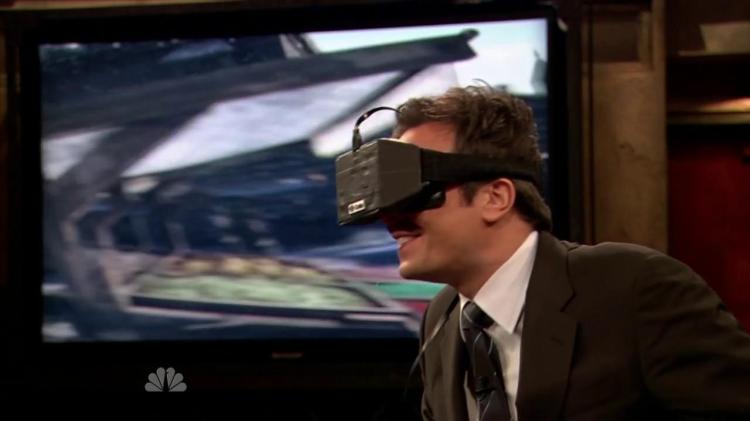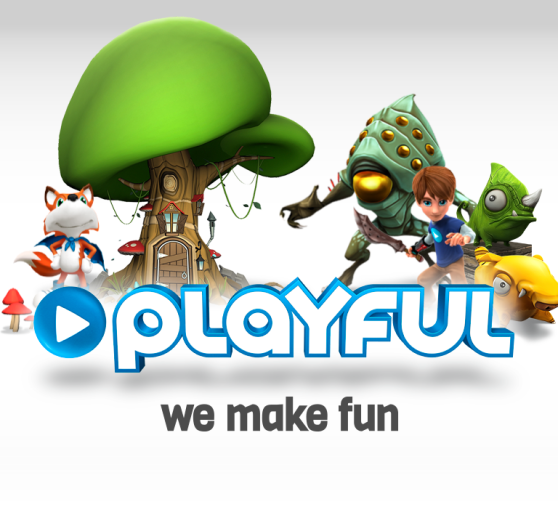Iribe: This is largely the same version in terms of hardware components, but the software continues to get much better. The tracking is better. Obviously the content is better. What we’re talking about here at E3 is content, games. Aaron’s been working with the community now for a year, which is awesome. That’s a lot of fun. We’ve been working with tons of developers in the community, creating content, and people are now starting to create made-for-VR polished experiences that feel very triple-A, very high quality.
Really, though, they’ve only had a few months to play with DK2 and Crystal Cove. Lucky’s Tale and a bunch of these games, these developers have only had weeks to months to play with some of the early prototypes of DK2. When we go out there and ship more than 40,000 DK2 preorders — the first day we start shipping we’re going to be on essentially the same order of magnitude in volume as the entire DK1 lifetime. It’s going to get out there in a huge way and get tons of developers excited and motivated to create great content. Then we’ll have a consumer product that shows up some time. Hopefully not too far away. It’s getting closer all the time.
The consumer product is going to be better in every way compared to the second developer kit. Just like the DK1 to DK2 was a pretty big leap — you’ve seen DK1. You even saw the early duct-tape prototype. Now DK2 is a huge leap forward. The consumer version is going to be another really big leap. That, for me, is the first time I got the true sense of presence. This gave me hints of presence, in DK2. Consumer V1 really delivers.
GamesBeat: And Mark Zuckerberg gets the first one?
Iribe: He joined forces with us to get rights to the future of Oculus VR with us, as a combined effort. He really shares the vision with us. He’s a really dynamic, smart guy. He shares the vision. That’s something we got that was unique to Mark and Facebook. Their CEO was excited from the very beginning, came down to visit and stayed super enthusiastic. We didn’t see that from Google or Microsoft or any of the other big companies. It made sense to partner with the person who was as enthusiastic as we were, who shared the vision. He turned around and said, “I’m all in on this. I’ll be as accessible as needed. Facebook will get fully behind this as the next compute platform.” That commitment was hard to turn down.
The thing that’s been great for the game space — we’ve had a number of people who’ve come up, people from big developers, publishers, console manufactures, and said, “Thank you so much, not just for doing Oculus and VR, but this partnership with Facebook is going to be very meaningful to the game space.” Oculus just became the second-largest company in gaming, all focused on VR. That’s pretty awesome.
 GamesBeat: When you think about essentially building the Metaverse, Facebook is the most natural company to do that with. They have those social relations mapped. You can build that up into a universe, a world that could then be social and virtual? How far away do you think we are from that kind of virtual world?
GamesBeat: When you think about essentially building the Metaverse, Facebook is the most natural company to do that with. They have those social relations mapped. You can build that up into a universe, a world that could then be social and virtual? How far away do you think we are from that kind of virtual world?
Iribe: You touched on a key point. One of the reasons we also looked at this partnership was just the infrastructure that Facebook has. They have more than 100,000 servers. I don’t know exactly how many. They have this incredible network infrastructure, ways to scale and get these virtual worlds made. Going out and building that kind of network is very expensive and very challenging. They’ve done an incredible job of it.
They’ve also been focusing on security and privacy and all these different issues for a decade now. You don’t want to underestimate that. These are issues that are very challenging to solve, and they have a few thousand people working on those. And they’ve built out the world’s largest social network. You trust your social networks, at least your first degree of friends that you’ve accepted. They’re people you know, unless you just accept everybody. In general, they’re people you know, who you’ve met in life.
In VR, if you take this step forward to put on the headset and go out and have a face-to-face conversation or gaming experience with people in the Metaverse, you’re probably going to do it with your friends, to start. Then you’ll also do it with new friends you meet in the Metaverse. A lot of people are going to jump in and be more comfortable interacting with their friends. Having Facebook understand what that means, after spending a decade on the social network side, is going to be very meaningful for the VR space.
That’s not to say you have to log in with your Facebook ID. You don’t have to. But having that backing is going to be important and meaningful. We’ll see. We can use whatever we want and not use what we don’t want to. We’re staying largely autonomous as far as the brand and the team. But it is a partnership. We’re excited to leverage a bunch of their systems. I think they did $3 billion through their payment system last year, just on the gaming side? We don’t have to build a payment system. That’s pretty nice. We have to build a part of one, but we don’t have to go through a lot of the challenges they’ve gone through as far as handling God knows how many currencies and so on.
GamesBeat: Do you have an idea of what’s attractive on the non-game entertainment front?
Iribe: Right now we’re focused on gaming. This is going to be the place where VR gets kicked off. It’ll be the majority of the content in the early days – all centered around gaming. If you think about it, even a decade from now, the technology of VR is built on a game engine. It’s a 3D scene that you’re rendering. That’s largely going to be built on a 3D game engine, because they’re the best 3D engines in the world. In the beginning it was SGI and Evans & Sutherland and some of the professional markets doing the 3D rendering engines. Now it’s the game market. This is going to be built around the game market for a very long time.
Education will be one of the bigger areas as we move forward. We have a big plan for supporting academia and universities, going out and helping to evangelize VR science from a research standpoint. If you look at the objects in VR, you believe an object. Your brain says, “Yes, this object is right here.” Suddenly you can scan in all kinds of objects and have an incredible educational platform built around that. Imagine scanning in the Smithsonian. There are so many things you can bring in and share and talk about.


